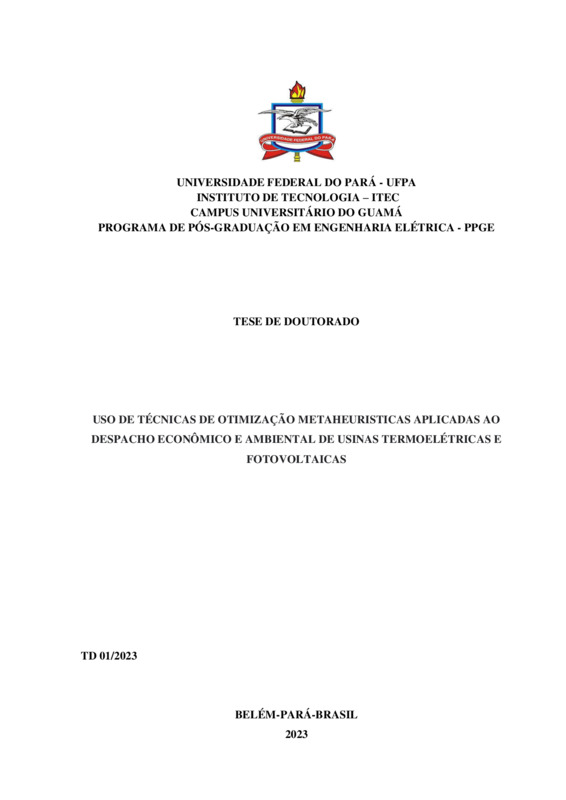-
Tipo do ITEM
-
pt-BR
Teses de Doutorado
-
Título da Dissertação ou Tese
-
pt-BR
USO DE TÉCNICAS DE OTIMIZAÇÃO METAHEURISTICAS APLICADAS AO DESPACHO ECONÔMICO E AMBIENTAL DE USINAS TERMOELÉTRICAS E FOTOVOLTAICAS
-
Descrição
-
pt-BR
O Despacho Econômico de Carga (ELD) é um processo do sistema elétrico de potência que visa o planejamento e a operação das Usinas Termelétricas (UTE), para o atendimento à demanda energética com menor custo operacional. Por outro lado, o ELD tornou-se um problema obsoleto por considerar somente o custo de combustível na geração de energia, desconsiderando parâmetros importantes como custos ambientais e de segurança da rede elétrica. A energia produzida pelas usinas termelétricas é considerada muito cara e poluente, ou seja, possui impactos negativos tanto na esfera ambiental, quanto para o cenário econômico. Considerando a pressão global para redução de emissões de poluentes na atmosfera e sustentabilidade ambiental, a incorporação da geração de Energias Renováveis (ER) ou Energias Verdes na rede elétrica é indispensável. A energia solar está se tornando uma parte importante do portfólio de geração de energia em muitas regiões devido à grande redução de seus custos e aos incentivos políticos que favorecem a geração de fontes de energia limpa e renováveis. Nesse sentido, a proposta da presente tese é apresentar um comparativo entre diversas técnicas metaheurísticas na otimização das soluções do Despacho Econômico Ambiental (DEA), incluindo a geração de energia solar fotovoltaica e o desligamento dos motores menos eficientes, bem como auxiliar o especialista na tomada de decisão para o funcionamento da planta geradora. Foram utilizados as metaheurísticas baseados em métodos estocásticos como: Ant Lion Optimizer (ALO), Dragonfly Algorithm (DA) e Differential Evolution (DE). Na busca por melhores soluções, foi implementado um novo algoritmo que verifica de forma inteligente a potência dos motores das usinas termoelétricas. Com base na potência demandada para o horário, é utilizado até 70% da capacidade da geração da usina fotovoltaica sendo o restante da demanda atendido pela usina termelétrica. Assim, encontra-se a potência ideal para o número mínimo de motores suficientes para atender a demanda, reduzindo o nível de combustível e poluentes na atmosfera. As simulações foram geradas no ambiente computacional do MATLAB, utilizando um modelo híbrido composto por seis (06) Unidades Geradoras (UG) e treze (13) Usinas Solares Fotovoltaica (USF). Os resultados obtidos foram comparados com os das simulações de Khan, que utilizaram o Algoritmo de Otimização por Enxame de Partículas em inglês: Particle Swarm Optimization (PSO). São apresentadas ainda comparações entre os métodos utilizados, sendo que dentre as técnicas metaheurísticas testadas, o DE foi o método que apresentou os melhores resultados, garantindo uma redução no combustível fóssil em 3,02%, correspondendo a US$ 8,557.08 e uma redução de poluentes na atmosfera de 1.42%.
-
Abstract
-
en
Economic Load Dispatch (ELD) is a process of the electric power system that aims at the planning and operations of Thermoelectric Power Plants (TPP), to meet the demand with lower operating costs. Conversely, the ELD has become an obsolete problem that regard only the fuel cost in energy generation, disregarding important parameters, such as environmental costs and the safety of the electrical network. The energy produced by thermoelectric plants it’s very expensive and polluting, that means, it has negative impacts on the environmental sphere and the economic scenario. Considering the global pressure to reduce pollutant emissions into the atmosphere and environmental sustainability, the incorporation of generation with Renewable Energies (RE) or Green Energies in the electric grid is indispensable. Solar energy is becoming an important part of the power generation portfolio in many regions due to the huge reduction in costs and the political incentives that favor the generation of clean and renewable energy sources. Seen in these terms, this thesis proposal is to submit a comparison between several metaheuristic techniques in the optimization of DEA solutions, including the generation of photovoltaic solar energy and the shutdown of less efficient engines, as well as helping the specialist in decision making for the operation from generator plant. Metaheuristics based on stochastic methods such as: Ant Lion Optimizer (ALO), Dragonfly Algorithm (DA) and Differential Evolution (DE) were used. In the search for better solutions, a new algorithm was implemented that intelligently checks the power of the thermoelectric motors. Based on the power demanded for time, up to 70% of the generation capacity of the photovoltaic plant is used and the rest is supplied by the thermoelectric plant. Thereby, the ideal power is found for the minimum number of engines sufficient to meet the demand, reducing the level of fuel and pollutants in the atmosphere. The simulations were generated in the MATLAB environment, using a hybrid model composed of six (06) Generating Units (GU) and thirteen (13) Solar Photovoltaic Plants (SPP). As a result, they were compared with the results of Khan's simulations, which used PSO (Particle Swarm Optimization). For that matter, the thesis presents comparative results of the methods used, among the techniques used, the DE was the method that presented the best results, guaranteeing a reduction in fossil fuel by 3.02%, corresponding to US$ 8,557.08 and a reduction of pollutants in the atmosphere of 1.42%.
-
Língua do arquivo
-
pt-BR
Português
-
Data da Defesa
-
pt-BR
27/01/2024
-
Palavra-chave
-
pt-BR
Despacho Econômico Ambiental
-
pt-BR
Unidade Térmica
-
pt-BR
Geração Solar Fotovoltaica
-
pt-BR
Técnicas Metaheurísticas de Otimização
-
Autor
-
pt-BR
Eliton Smith dos Santos
-
Orientador
-
pt-BR
Marcus Vinicius Alves Nunes
-
Local
-
pt-BR
Belém/Pará
-
Áreas de Conhecimento
-
pt-BR
Engenharia Elétrica
-
Turma
-
pt-BR
Turma 01


